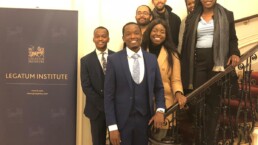The political landscape in Africa has seen dramatic changes with elections, multi-party politics, civil society and human rights taking centre stage. Most authoritarian regimes have been forced to yield political space and grant civil and political rights to the people under the banner of “democracy”. Democracy literally means “Rule by the People” and further incorporates four key principles: it is a political system for choosing and replacing governments through free and fair elections; it involves the participation of citizens in political and public discourse and allows people to have a say in decision-making processes; it affords protection of human rights and fundamental freedoms to all citizens; and promotes respect for the rule of law which means that all people and institutions are subject to and accountable to the law. A common misunderstanding is that a government that adheres to only one of these principles automatically constitutes a “democratic government”. This is a gross misconception as these principles and others such as accountability, transparency and responsiveness are all mutually reinforcing.
One of the challenges with democracy in Africa is that elections are seen as the sole indicator of true democratic rule, thus restricting political organization to merely a representative or institutional form of democracy. However, the right to vote in free and fair elections is only one aspect to consider when determining the overall quality of a democratic state. The biggest threat posed, should we adopt this narrow and flawed understanding of democracy, is the rise of “democratic despotism” which is a benign form of social control within a democracy by a centralized bureaucratic state supported by a weakened and isolated citizenry. The lack of citizen power and voice in politics and society is already an endemic issue not only in South Africa, but the African continent as a whole, and unless the ideas and perspectives of citizens are transmitted to the political and social arena, we cannot talk about the “power of the people”. It is for this reason that I advance the argument that public participation is the bedrock of democracy and thus imperative in promoting good governance and development.
South Africa, like many other countries in Africa, made its historic transition from authoritarian rule to democracy with the founding elections in 1994. South Africa’s democracy is guided by and rooted in its constitution, which is also the supreme law of the country and enshrines ideals of freedom, equality, human dignity, justice, good governance and peace. In line with these principles, it further purports to protect the rights of all citizens and has provisions to hold political leaders accountable so that citizens are not subjected to the whims of an oppressive autocracy but instead, can be active participants in a vibrant constitutional democracy.
The right to public participation is captured in various International law instruments such as the International Covenant on Economic, Social and Cultural Rights; International Covenant on Civil and Political Rights as well as the African Charter on Human and People’s Rights. On a national level, the right to public participation is implicit in the constitution and its rights related to equality, human dignity and freedom. This makes public participation a human right that must be respected, protected, promoted and fulfilled together with all other human rights.
Public participation is a process that directly engages the public in decision-making processes and gives full consideration of public input in making that decision. Through the participation of civil society in decision-making, agreement is reached on the most important challenges that local communities face. The quality and effectiveness of a policy, programme or plan wholly depends on the extent of the involvement of all stakeholders (communities in particular) in decision-making from its conception to the implementation thereof.
However the state of affairs in relation to public participation is far removed from that envisaged by the constitution and other policy prescripts as public participation is seen as the proverbial elephant in the room. This means that government superficially notes the importance of public participation for democracy and governance but defies engaging it due to the perceived complexity the process of participation may hold for them. Where participation does occur, it is often purely procedural and not intended to incorporate ideas and demands put forward by people, or to genuinely engage with substantive issues around the nature of development. In most cases where government initiates development projects, they are generally implemented with limited or non-existent engagement.
This approach has drastically compromised democracy and created feelings of anger and distrust by the people towards their elected representatives as they believe that they are not heard and that their views are not important in development projects that have a direct impact on their lives. South Africa’s people have taken to the streets, as a last resort, to publicly vent their dissatisfaction with the poor service delivery offered to them. However, the frequency of these protests over the past 10 years has been concerning and has dubbed South Africa as “the protest capital of the world” with one of the highest rates of public protests globally. Since 2008 more than 2 million people have taken to the streets in protest every year. These violent protests fuelled by frustration, suspicion and distrust of the government, often leads to destruction of public property and this is mainly due to the lack of engagement of the community by the government relating to issues of service delivery (or lack thereof). This situation has become untenable and has now reached a point of crisis.
I am of the view that we should revert to the basics and that is to allow a space for the voice of citizens to be heard. Public Participation has many direct advantages:
- The engagement of citizens in local decision making processes not only guarantees the development of a democratic system but promotes sustainable development.
- Citizen participation promotes government policy, programme and project formulation, re-formulation, implementation and monitoring and evaluation. In other words, the participation of citizens legitimises policies made by government.
- Engaging citizens in decision-making makes the implementation of a decision or policy more likely and also builds trust among the government and the people
- Engaging the public in the decision-making process serves to educate both citizens and policy-makers about the various facts of a particular decision or issue from a variety of perspectives.
It is unclear however whether state officials understand the obligation of, and rationale for, community engagement and participation and how to effectively engage in these processes. This apparent confusion was evident in the case of Beja versus Premier of the Western Cape where the Western Cape High Court ruled that a purported partnership agreement between the community of Makhaza and the City of Cape Town, dealing with the provision of sanitation in an upgraded informal settlement, was invalid. The Court also ruled that the City acted unreasonably in constructing Unenclosed Toilets in the new settlement because it failed to meaningfully engage with the community about the issue. The judgment left the City confused about the nature and scope of the duty to involve the community in urban development projects. The Beja toilet saga and its aftermath revealed how uncertainty about the scope and nature of the duty to democratically engage the community in development projects can have a negative impact on the realisation of socio-economic rights in general. What is clear from the Beja case is that the government had no understanding in terms of the form, extent and quality of the public engagement that were required.
Within the South African context there remains much to be done to give substance and meaning to the right to public participation:
Firstly, I would propose to institutionalise engagement: This means that government will be required to immediately develop comprehensive engagement policies and procedures which will be institutionalised throughout the entire administrative state. It has been argued by scholars such as Brian Ray, that institutionalising engagement will enhance the capacity and willingness of government to approach engagement from a holistic rather than narrow perspective. This institutionalised approach to public engagement will create the sustained and long-term focus on the process necessary to make engagement a meaningful process which over time can begin to develop best practices that can be applied across programmes relating to socio-economic rights realization.
Linked to this proposition however are the following concerns:
i) South Africa is in its twenty fifth year of democracy and has not yet began any progressive work to develop mandatory policies and procedures relating to public participation. Currently it relies heavily on the ward committees to fulfil this function and although these committees are meant to identify key issues affecting their wards and deliberate upon them, the failure to integrate ward committees explicitly into decision-making or delivery processes of the local municipality means that there is little impact beyond merely deliberating. The government has also attempted to promote public participation through izimbizos which is also ineffective because instead of it being a forum for genuine community engagement with local leaders, it tends to be a public relations exercise at best, and at worst, sites for capture by political elites. All these practices still leave the gap between the state and people wide open, because they are largely ineffective.
ii) Lack of knowledge, political will and/or understanding of the scope of public participation by the government is a serious concern. By the number of cases that have already gone through the Constitutional Court, it is clear that participation is still conducted on an ad hoc basis which is guided by the courts. This approach by government is not sustainable and the need for policy direction on public participation remains fundamental, especially at local government level.
iii) The role of civil society must be enhanced to apply pressure on government to institutionalise engagement and to bring a broader understanding of public participation on a national level. Whilst the public are not yet fully aware of the potential that lies within public participation, it will be critical for civil society organisations to do work to raise that awareness amongst the people about the inherent benefits of public participation and how to enforce it.
Secondly, the empowerment of citizens to effectively engage with government is vital. This will require capacitating and educating the public on legislation and related policies including the Constitution. South Africans in general are not adequately informed on the exact role and function of its government, its policies and how it affects them. If South Africans are more informed they will take more informed decisions and that is vital for a public engagement process to be fully effective. More so, it will allow the public to hold their elected representatives accountable against a standard of action required in a specific process.
Thirdly, for engagement to act as a legitimate mechanism, it will require the courts to continue to develop the engagement remedy, and in particular to exercise control and to intervene where government fails to meaningfully engage. Our Constitutional Court has the experience in using the engagement remedy and until such time that government develops adequate engagement infrastructure, strong court involvement is necessitated. Keeping in mind the principle of separation of powers, the court will be able to direct the government through the engagement remedy though not forcibly encroaching on the mandate of government to develop and implement such policy. The Joe Slovo and Olivia Road cases gave evidence, that strong court intervention is still necessary to provoke meaningful engagement. Specifically in the Joe Slovo case, there were strong doubts on the quality of “pre-eviction meaningful engagement” and it was only after the court ordered engagement over the specific details of the eviction, including devising a detailed agenda of the issues for engagement, that government took seriously the possibility of in situ upgrading rather than relocation which the residents initially wanted.
Fourthly, once government develops engagement policies and procedures, it must disseminate those policies and train government officials to implement them. Capacitating government officials with the skills and knowledge will be required to effectively implement public participation policies as this is one of the fundamental reasons why even ad hoc public engagement, as it is currently taking place, fails dismally.
In conclusion, public participation is a constitutionally protected right for citizens and a constitutional obligation for the state. Though the scope of public participation may be considered to be broad and controversial, it is clear from the various Constitutional Court judgments that within the scope of socio-economic rights projects, public participation is required in the planning, implementation and evaluation of the project, program or plan. Public participation must be reintroduced as a discussion point at local, provincial and national levels as the continuous failure by the state to engage its citizens in decisions that affect them will have devastating consequences for governance and government legitimacy in the eyes of its people.
The views expressed in this article are those of the author alone and not the Future Africa Forum.
The views expressed in this article are those of the author and do not necessarily reflect the views of Future Africa Forum. Future Africa Forum is a pan-African policy think-tank and policy advisory consultancy headquartered in Nairobi, Kenya.



